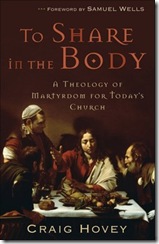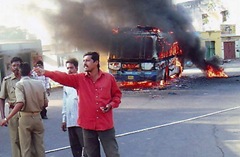Breaking free the chains
 Who can forget the image of Paul and Silas in prison singing praises to God as an earthquake opened cell doors and shattered chains? (Acts 16:22-40). I was reminded of this remarkable event while reading a recent report from Compass Direct about an imprisoned Eritrean evangelist, Teame Weldegebriel, who is being treated especially badly because of his ministry to fellow inmates. His cell doors have not flung open yet, but even in his detained state God is working through him—using him to break free the chains of unbelief fastened around fellow prisoners.
Who can forget the image of Paul and Silas in prison singing praises to God as an earthquake opened cell doors and shattered chains? (Acts 16:22-40). I was reminded of this remarkable event while reading a recent report from Compass Direct about an imprisoned Eritrean evangelist, Teame Weldegebriel, who is being treated especially badly because of his ministry to fellow inmates. His cell doors have not flung open yet, but even in his detained state God is working through him—using him to break free the chains of unbelief fastened around fellow prisoners.
You can read more about this brother below and I urge you to continue to uphold him and other imprisoned believers in prayer.
Wednesday September 24, 2008
ERITREA: CHRISTIANS LANGUISH IN PRISONS
Evangelist fears he will die in confinement.
LOS ANGELES, September 24 (Compass Direct News) – An evangelist imprisoned since 2006 for his Christian activities is receiving especially harsh treatment because of his ministry to inmates.
Sources said Teame Weldegebriel is on the brink of despair as he languishes at the Mai Sirwa Maximum Security Confinement prison.
“It seems that hell has broken loose on me,” Weldegebriel told Compass sources. “Please tell the brethren to continue praying for me. I am not sure I will see them again.”
Prison authorities consider Weldegebriel dangerous because of his boldness in sharing his faith. The Rhema Church evangelist has been proclaiming Christ to other prisoners, and many have converted to Christianity.
“This has made him to be in bad books with the prison wardens,” one source said. Weldegebriel’s family is worried about his health after trying repeatedly, without success, to get permission to visit him.
Inmates at the prison often go hungry and are said to be feeding on leaves.
In Eritrea, a nation with a government of Marxist roots where about half of the people are Muslim, two or more people gathered in Jesus’ name can be imprisoned for not practicing their faith in one of the government-sanctioned Orthodox, Catholic, Lutheran or Muslim bodies.
More than 2,000 Christians in Eritrea are imprisoned for their faith, including a Christian from a Full Gospel Church who was arrested in 2001. His wife last saw him in June 2007. She and her two minor children were rounded up from a prayer meeting in mid-July and placed in a metal shipping container until their release last month, she said.
“I was arrested with my children while having a prayer meeting with 20 other Christians,” said the woman, who requested anonymity for security reasons. “They locked us up at a military concentration camp, inside metal ship containers. I remember the horrible ordeal I went through with the children. After three weeks I was released with my two children, while the other Christian soldiers remained locked in the prison cells.”
The government views leaders of large unregistered bodies like the Full Gospel Church and Rhema Church as threats, according to Christian sources in the country. Eritrean officials fear the church leaders will expose the abuses and conditions in the prisons. Hence it is extremely difficult for relatives to see those in prison, and inmates are not allowed to send or receive letters.
“The government has been transferring them from one prison cell after another,” said one Christian source in Asmara.
In May 2002 the government criminalized all independent churches not operating under the umbrella of the Orthodox, Lutheran, Catholic, and Muslim religious structures.
Arrested for Talking
In the seaport city of Massawa, police in June arrested a man and a woman, both Christians, who were talking to Muslims about Christ. Members of Kale Hiwot Church, the two were discussing their Christian faith when four plainclothes policemen arrested them.
“It took about 30 minutes talking about Jesus before they were both arrested by the police – they had witnessed about Jesus and the faith for a long time to some Muslims,” another source told Compass. “I watched the two Christians whisked away by the police. They were taken to join more than 100 Christians imprisoned in Waire prison about 25 kilometers [16 miles] from Massawa.”
A previously imprisoned evangelist with the Full Gospel Church in Asmara who requested anonymity told Compass that God is at work in Eritrea, with many people converting to Christ and receiving divine healing.
“For sure Christians are getting imprisoned, but God’s word cannot be imprisoned,” he said. “I am ready for any eventuality, including being imprisoned again. On several occasions, prison wardens warned me to stop preaching, though they still loved me. Indeed Jesus loved me. They saw God in me.”
The U.S. Department of State notes in its 2008 International Religious Freedom Report that Eritrea has not implemented its 1997 constitution, which provides for religious freedom. The state department has designated Eritrea as a Country of Particular Concern, a list of the worst violators of religious freedom, since 2004.
Many of the more than 2,000 Christians under arrest in police stations, military camps and jails across Eritrea because of their religious beliefs have been incarcerated for years. No one has been charged officially or given access to judicial processes.
Reliable statistics are not available, but the state department estimates that 50 percent of the population is Sunni Muslim, 30 percent is Orthodox Christian, and 13 percent is Roman Catholic. Protestants and Seventh-day Adventists along with Jehovah’s Witnesses, Buddhists, Hindus, and Baha’is make up less than 5 percent of the population.
























